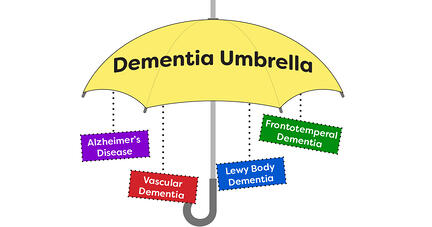Basics of Dementia: Types, Signs & Symptoms

From memory impairment and difficulty completing daily tasks to visual hallucinations and impaired judgement the world of dementia and Alzheimer’s is varied and may seem overwhelming.
Let’s start with the word ‘dementia’, it is commonly associated with memory decline, forgetfulness and aging. The word dementia is an umbrella term that encompasses multiple types of brain/memory disorders. It is a term that describes a decline in mental abilities that are severe enough to interrupt daily life. Under the umbrella of dementia lives a variety of diseases related to memory and the brain. Covered here are the following types of dementia: Alzheimer’s Disease, Lewy Body Dementia, Vascular Dementia and Frontotemporal Dementia.
Alzheimer’s Disease
A good place to start is the most common dementia diagnosis, Alzheimer’s Disease. Often the words dementia and Alzheimer’s are used interchangeably, although Alzheimer’s Disease is the most common form of dementia, it is not the only form and lives within its own bubble under the dementia umbrella.
Alzheimer’s Disease is a progressive brain disorder that erodes memory and thinking skills overtime to the point that carrying out activities of daily living becomes difficult. With Alzheimer’s Disease plaques and tangles build up in the brain making it difficult for the brain to send messages to the muscles and organs within the body.
Signs to watch for:
- Struggling to complete a task with multiple steps (ex. Brushing teeth, getting dressed)
- Losing things or misplacing them in odd places
- Mood and personality changes
- An increase in anxiety
- Shortened attention span
- Difficulty with language (problems with reading, writing, and working with numbers)
- Wandering or getting lost
- Repetitive questions
Looking for resources or support? There is an abundance of resources available to learn more about Alzheimer’s Disease from support groups for caregivers to adult day programs, and senior living communities specializing in memory care. The best place to start is to consult a doctor about a possible Alzheimer’s disease diagnosis. Places like The Alzheimer’s Association are a great place to learn more and find supportive resources like in person or virtual support groups. At Northbridge, we are proud to offer Avita Memory Care, a supportive place where residents thrive and families find peace of mind. Click here to find a Northbridge Avita Memory Care neighborhood or community near you!
Lewy Body Dementia
Another form of dementia found under the umbrella is Lewy Body Dementia which includes symptoms that resemble both Alzheimer’s and Parkinson’s disease causing most cases to go widely under-diagnosed. Lewy Body Dementia affects several parts of the brain that control: information processing, perception, language, emotion, movement, sleep, alertness, and memory.
There are two types of Lewy Body Dementia: Dementia with Lewy Bodies and Parkinson’s Disease Dementia.
Dementia with Lewy Bodies: this form of Lewy Body starts with symptoms similar to Alzheimer’s Disease, a progressive cognitive decline. Unlike Alzheimer’s, later stage symptoms may include hallucinations, slowness of movement and sleep behavior problems.
Parkinson’s Disease Dementia: this form of Lewy Body starts as a movement disorder and later progresses showing signs of cognitive decline and changes in mood and behavior.
In addition to the signs we mention for Alzheimer’s Disease, people living with Lewy Body Dementia may show these unique signs:
- Visual hallucinations
- Trouble with movement that includes tremors, stiffness, slowness and difficulty walking
- Sleep disorders
- Trouble regulating temperature, blood pressure, bladder and bowel function.
- Fluctuation in mood and behavior that includes depression, apathy, anxiety, delusions or paranoia
Vascular Dementia
Typically caused by a blockage or lack of blood flow and oxygen to the brain, Vascular Dementia is another form that lives under the umbrella. A lack of blood and oxygen to the brain can be caused by multiple things including but not limited to a stroke, heart attack and aneurysm. The signs and severity of symptoms is dependent on how long the brain went without oxygen and blood.
Signs to look for:
- Memory loss
- Language problems (aphasia)
- Visual orientation problems
- Hallucinations
- Impaired motor skills
- Unsteady gait
- Difficulty planning and organizing
Frontotemporal Dementia
The last form of dementia under the umbrella covered in this blog is Frontotemporal Dementia. This form of dementia occurs when nerve cells in the frontal and temporal lobes of the brain are lost, causing the lobes to shrink and effecting behavior, personality, language and movement.
The two common types within Frontotemporal Dementia are:
Frontal Variant: effecting behavior and personality
Primary Progressive Aphasia: effecting communication skills
Signs to look for:
- Behavior and personality changes (ex. swearing, stealing, change in hygiene level)
- Socially inappropriate or impulsive repetitive behavior
- Decreased self-awareness
- Unable to use or understand language
- Loss of interest in normal daily activities
- Signs for Frontotemporal Lobe Dementia tend to show at a younger age then other forms of dementia and may become apparent in someone as young as 40-65 years old.
Caring for someone with any form of dementia comes with unique challenges. It is important to remember you are not alone and that there is a wide range of available services and support.
For more information on caregiving resources check out our blogs:
Caring for a Spouse with Alzheimer’s: 5 Tips for Spousal Caregivers
5 Tips- Caregiver Support and Self-Care
Guest Blog: 5 Tips for Managing Caregiver Stress with Liz O’Donnell from Working Daughter
For more information on Alzheimer’s and related dementias check out our blogs:
10 Next Steps after a Dementia Diagnosis
If you think it might be time to consider more care, we encourage you to reach out to a Northbridge community. Our Avita Memory Care program is designed to create a safe and fulfilling environment for those living with Alzheimer’s Disease or related dementias.